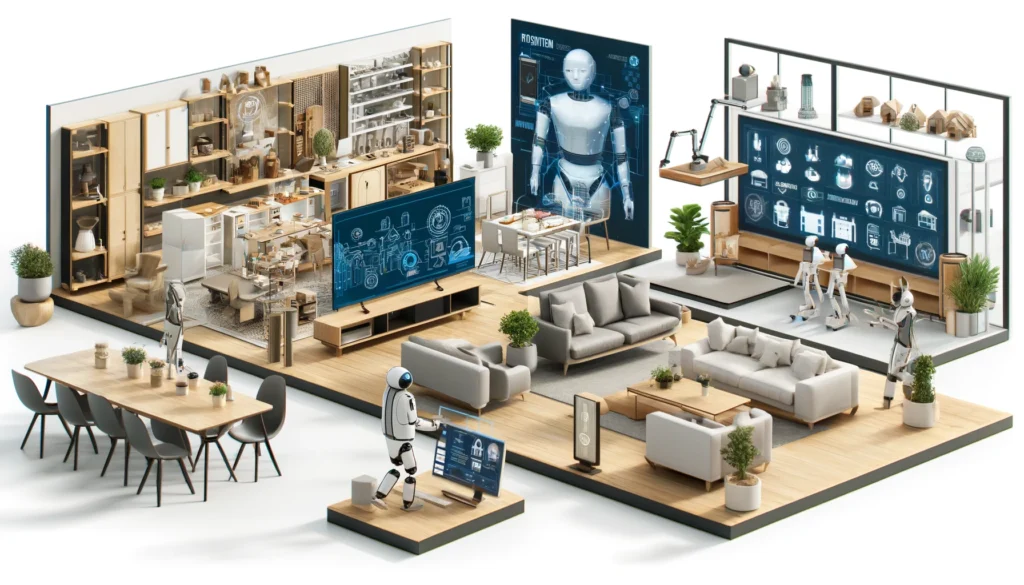The Impact of Artificial Intelligence on the Furniture Industry
The integration of artificial intelligence (AI) into various industries has revolutionized traditional practices, and the furniture industry is no exception. From design and manufacturing to sales and customer service, AI is transforming the way furniture companies operate, providing numerous benefits such as increased efficiency, enhanced customer experience, and innovative product development. This article explores the significant impact of AI on the furniture industry, highlighting key applications and future prospects.

AI in Furniture Design
One of the most exciting applications of AI in the furniture industry is in the realm of design. Traditionally, furniture design has been a labor-intensive process requiring significant time and expertise. However, AI-powered design tools can now analyze vast amounts of data, including customer preferences, market trends, and ergonomic principles, to generate innovative and customized furniture designs.
For instance, AI algorithms can analyze customer feedback and sales data to identify popular styles and features, allowing designers to create products that align with current market demands. Additionally, AI can assist in creating ergonomic designs by analyzing human body mechanics and suggesting optimal shapes and structures for furniture pieces.
AI in Manufacturing
The manufacturing process in the furniture industry has also benefited significantly from AI integration. AI-powered automation systems can streamline production lines, reducing the need for manual labor and minimizing errors. These systems can handle repetitive tasks such as cutting, assembling, and finishing with high precision and consistency, leading to improved product quality and reduced production costs.
Furthermore, AI can enhance supply chain management by predicting demand patterns and optimizing inventory levels. By analyzing historical sales data and market trends, AI algorithms can forecast future demand, ensuring that manufacturers produce the right quantity of products at the right time, thereby minimizing waste and overproduction.
AI in Sales and Marketing
AI is revolutionizing the way furniture companies approach sales and marketing. Personalized marketing campaigns powered by AI can analyze customer data to create targeted advertisements and product recommendations. By understanding individual preferences and shopping behaviors, AI algorithms can deliver personalized content to potential customers, increasing the likelihood of conversion.
In the realm of sales, AI-powered chatbots and virtual assistants are enhancing customer service. These AI-driven tools can handle customer inquiries, provide product information, and assist with online purchases, offering a seamless and efficient shopping experience. Additionally, AI can analyze customer interactions and feedback to continuously improve the quality of service.
AI in Customer Experience
Enhancing customer experience is a critical focus for furniture companies, and AI is playing a pivotal role in achieving this goal. Virtual and augmented reality (VR/AR) applications powered by AI allow customers to visualize furniture in their own spaces before making a purchase. By using their smartphones or VR headsets, customers can see how different furniture pieces will look and fit in their homes, helping them make informed decisions.
Moreover, AI can personalize the shopping experience by recommending products based on individual preferences and past purchases. This level of personalization not only enhances customer satisfaction but also increases customer loyalty and repeat business.
Future Prospects
The future of AI in the furniture industry looks promising, with ongoing advancements and innovations expected to drive further transformation. As AI technology continues to evolve, we can anticipate even more sophisticated design tools, smarter manufacturing processes, and more personalized customer experiences.
For instance, AI-driven predictive analytics could revolutionize trend forecasting, allowing furniture companies to stay ahead of market demands and consumer preferences. Additionally, advancements in AI-powered robotics could lead to fully automated production lines, further improving efficiency and reducing costs.
Conclusion
The integration of artificial intelligence into the furniture industry is ushering in a new era of innovation and efficiency. From design and manufacturing to sales and customer service, AI is transforming traditional practices and offering numerous benefits. By embracing AI, furniture companies can enhance their competitiveness, improve product quality, and provide exceptional customer experiences. As technology continues to advance, the future of AI in the furniture industry holds immense potential for further growth and transformation.

